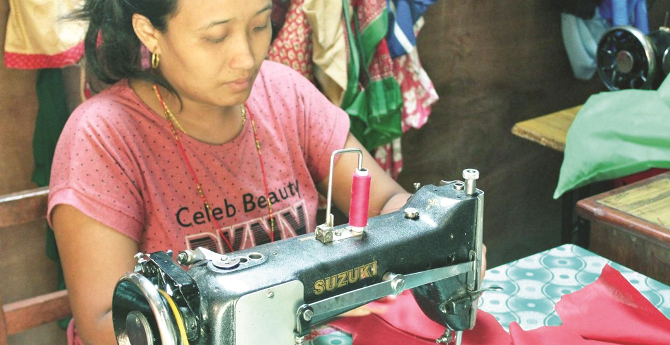Lockdown venture: From income loss to self-employment

By Aashish Mishra
Kathmandu, Nov. 26: When the government imposed the nationwide lockdown on March 24, Divya Jyoti Kharel had the rug pulled from under her feet. A biology teacher at a high school in Kathmandu, Kharel knew that as long as the lockdown lasted, she would not receive her salary and this gravely worried her.
“I was genuinely terrified. Everything turned dark,” Kharel recalled her feeling in the initial days of the corona-induced shutdown. “I kept hoping and praying for the lockdown to end soon.”
The first two months were tough but tolerable. Kharel had some money in the bank and the landlord waived her rent. But things began going downhill from the third month. “I exhausted my savings, had no way of supporting myself and there was no end to the lockdown in sight.”
That’s when she decided she needed to do something. But what? “I could sew and knit, so why not do that?”
She told her friends and neighbours that she was looking to sew clothes and before long, people were bringing their old clothes to her for repair. “Depending on the garment and the type of repair needed, I charged Rs. 50 to Rs. 200,” she informed. “Things started slow but within a few weeks, the volume of orders increased considerably and I actually started making more than what I earned as a teacher.”
Kharel hasn’t received a rupee of her salary from the school for eight months now. But it doesn’t matter. She is busy enough with her sewing business and with the winter approaching, she is planning to knit and sell woollen caps, gloves and sweaters. “I might quit my job altogether because why work for an institution that doesn’t help you in your time of need? I will work for myself.”
The four-month lockdown was a curse for many in the country. Countless people lost their jobs and incomes and suffered indescribable hardships. But some were able to turn this curse into an opportunity for innovation and entrepreneurship. Binoy Dyola was one such person.
Before the lockdown, he worked as an electrician in a publishing house. But the house closed in March and the management decided to close it permanently in May, leaving Dyola unemployed. “We employees didn’t even get our last month’s salary,” he shared.
But Dyola didn’t sit around moping. He immediately started phoning his friends and relatives to see if anyone had a job for him. Luckily, one of them did. “My wife’s brother-in-law is a contractor and he needed someone to handle the electrical wiring in one of the houses he was working on. I said ‘I will do it and got to work’,” he said.
Impressed with his skills, the brother-in-law gave Dyola a few more houses to work on. This helped him gain familiarity with the business and now, he works as a full-time electrical contractor. “I earn more and have fun doing this. I am thankful for the lockdown because it showed me a new career path,” he said, adding that he would teach his son to take up electrical work too.
Similarly, Rozan Luitel, a freelance rapporteur, found that organisations were not offering any jobs during the closure. “At a time when even full-time employees were getting laid off, freelancers like me couldn’t even dream of getting work,” he said.
Luitel wasn’t much concerned at first. But as weeks turned to months and the lockdown kept getting extended, he started feeling the pinch. That’s when his girlfriend suggested that they become footpath vendors.
“She convinced me that it was a low-investment high-profit business and she also had contacts with suppliers. So, we started,” he said.
Luitel and his partner started with toothbrushes and mouthwash and then moved on to rings and necklaces. These days, they sell clothes and mobile covers. “Lockdown forced us to get creative with our livelihoods,” he chuckled.
Recent News

Do not make expressions casting dout on election: EC
14 Apr, 2022
CM Bhatta says may New Year 2079 BS inspire positive thinking
14 Apr, 2022
Three new cases, 44 recoveries in 24 hours
14 Apr, 2022
689 climbers of 84 teams so far acquire permits for climbing various peaks this spring season
14 Apr, 2022
How the rising cost of living crisis is impacting Nepal
14 Apr, 2022
US military confirms an interstellar meteor collided with Earth
14 Apr, 2022
Valneva Covid vaccine approved for use in UK
14 Apr, 2022
Chair Prachanda highlights need of unity among Maoist, Communist forces
14 Apr, 2022
Ranbir Kapoor and Alia Bhatt: Bollywood toasts star couple on wedding
14 Apr, 2022
President Bhandari confers decorations (Photo Feature)
14 Apr, 2022









